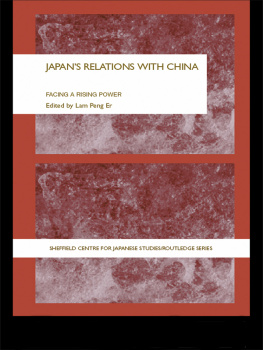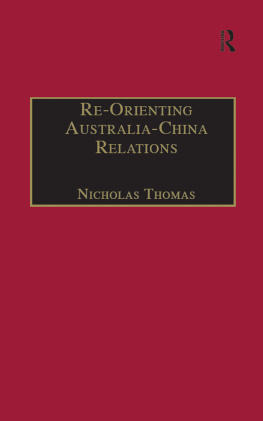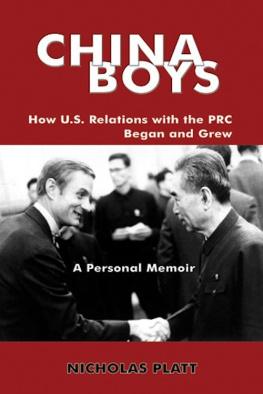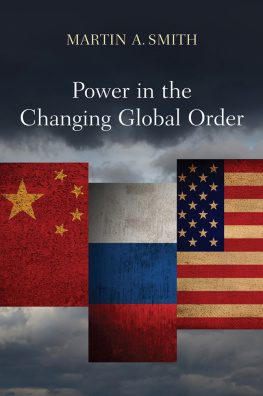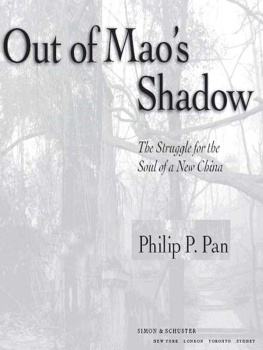Nicholas D. Kristof - China Wakes: The Struggle for the Soul of a Rising Power
Here you can read online Nicholas D. Kristof - China Wakes: The Struggle for the Soul of a Rising Power full text of the book (entire story) in english for free. Download pdf and epub, get meaning, cover and reviews about this ebook. year: 2011, publisher: Vintage, genre: Non-fiction. Description of the work, (preface) as well as reviews are available. Best literature library LitArk.com created for fans of good reading and offers a wide selection of genres:
Romance novel
Science fiction
Adventure
Detective
Science
History
Home and family
Prose
Art
Politics
Computer
Non-fiction
Religion
Business
Children
Humor
Choose a favorite category and find really read worthwhile books. Enjoy immersion in the world of imagination, feel the emotions of the characters or learn something new for yourself, make an fascinating discovery.

- Book:China Wakes: The Struggle for the Soul of a Rising Power
- Author:
- Publisher:Vintage
- Genre:
- Year:2011
- Rating:4 / 5
- Favourites:Add to favourites
- Your mark:
- 80
- 1
- 2
- 3
- 4
- 5
China Wakes: The Struggle for the Soul of a Rising Power: summary, description and annotation
We offer to read an annotation, description, summary or preface (depends on what the author of the book "China Wakes: The Struggle for the Soul of a Rising Power" wrote himself). If you haven't found the necessary information about the book — write in the comments, we will try to find it.
China Wakes: The Struggle for the Soul of a Rising Power — read online for free the complete book (whole text) full work
Below is the text of the book, divided by pages. System saving the place of the last page read, allows you to conveniently read the book "China Wakes: The Struggle for the Soul of a Rising Power" online for free, without having to search again every time where you left off. Put a bookmark, and you can go to the page where you finished reading at any time.
Font size:
Interval:
Bookmark:
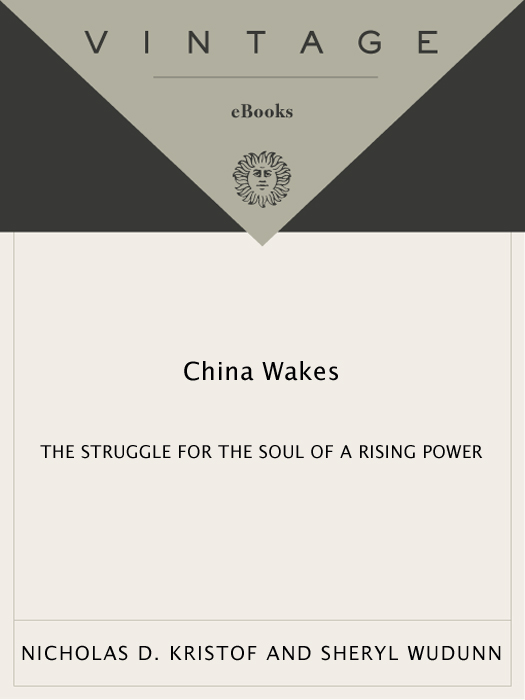
Nicholas D. Kristof grew up on a sheep and cherry farm near Yamhill, Oregon, and began his reporting career as a high school sophomore covering agriculture for the county semiweekly newspaper. He graduated from Harvard College in three years, Phi Beta Kappa, then studied law at Oxford University on a Rhodes Scholarship. After graduating with first class honors, he studied Arabic for a year in Cairo and joined The New York Times in 1984 as an economics reporter. He was Los Angeles financial correspondent for The Times before becoming Hong Kong bureau chief in 1986 and Beijing bureau chief in 1988.
Sheryl Wudunn, a third-generation Chinese-American who grew up in New York City, graduated with honors from Cornell University and worked as an international loan officer for Bankers Trust Company for three years. She then went to Harvard Business School, where she earned her M.B.A., and to Princeton University, where she earned a masters of public administration in international affairs. Her interests switched to journalism, and she worked for several major newspapers before joining The New York Times as a correspondent in Beijing.
Kristof and WuDunn were married in 1988 and have two sons: Gregory, born in 1992, and Geoffrey, born in May 1994. Kristof and WuDunn won the Pulitzer Prize for their coverage of the 1989 Tiananmen protests in China, becoming the first married couple ever to win a Pulitzer for journalism. Their China coverage also won them the George Polk Award for foreign reporting. They are now correspondents in Tokyo for The New York Times.

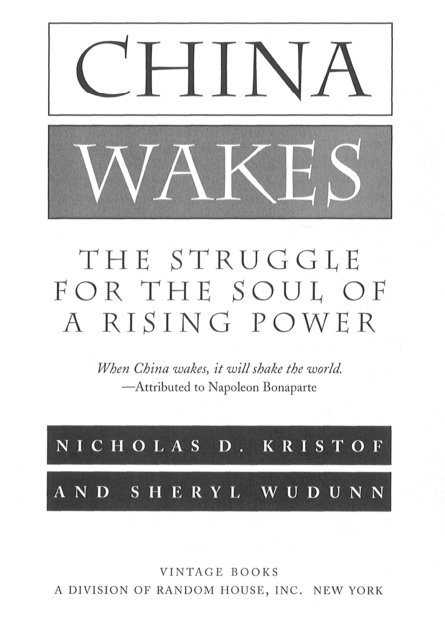

FIRST VINTAGE BOOKS EDITION, AUGUST 1995
Copyright 1994 by Nicholas D. Kristof and Sheryl WuDunn
Maps copyright 1994 by Anita Karl and Jim Kemp
All rights reserved under International and Pan-American Copyright Conventions. Published in the United States by Vintage Books, a division of Random House, Inc., New York, and simultaneously in Canada by Random House of
Canada Limited, Toronto. Originally published in hardcover by Times Books, a division of Random House, Inc., New York, in 1994.
Portions of this work were originally published in different form in Foreign Affairs and The New York Times Magazine.
The Library of Congress has cataloged the Times Books edition as follows:
Kristof, Nicholas D.
China wakes : the struggle for the soul of a rising power / Nicholas D. Kristof and
Sheryl WuDunn.
p. cm.
eISBN: 978-0-307-76423-2
1. ChinaEconomic conditions1976 2. ChinaSocial conditions1976
3. ChinaPolitics and government1976
I. WuDunn, Sheryl. II. Title.
HC427.92.K75 1994
306.0951dc20 94-10609
Chinese calligraphy by Chingan Tang
v3.1
For Our Parents, Ladis and Jane Kristof
and David and Alice WuDunn,
and for Sirena WuDunn (19621983)
Our foremost concern in writing this book has been to protect our Chinese friends and acquaintances. Too many Chinese are already languishing in jail because foreigners were insufficiently careful, and we have no desire to add to the prison crowding problem.
Consequently, we have changed the names of some Chinese sources. Whenever we give a one-word namesuch as Hongjun, who spied on usit is a pseudonym. When we give a full namesuch as Lin Hanxiong, the government minister who could not control his libidoit is a real one.
As will become clear, Nick wrote and the other even-numbered ones (except for the last chapter, which we wrote together). As our two lives have been independent yet intertwined, it seemed best to write in the same way.
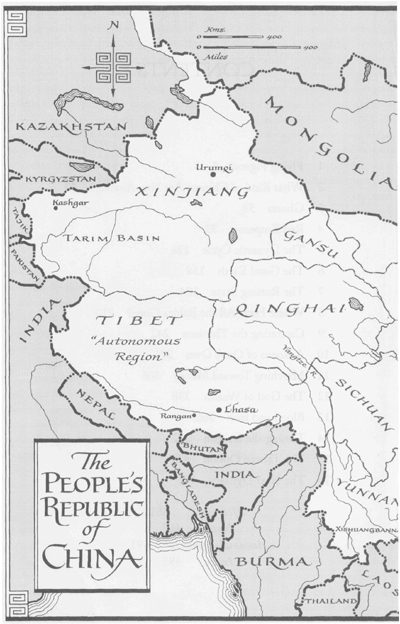
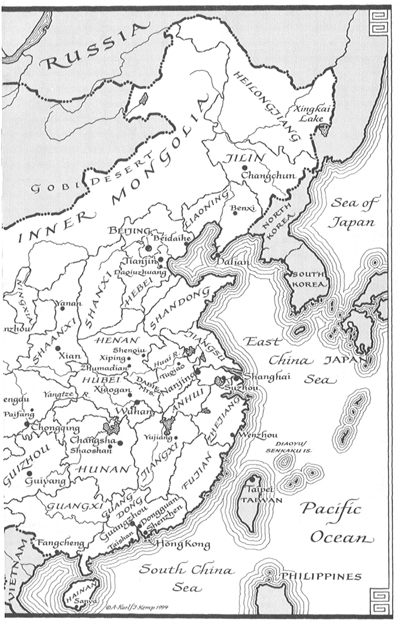
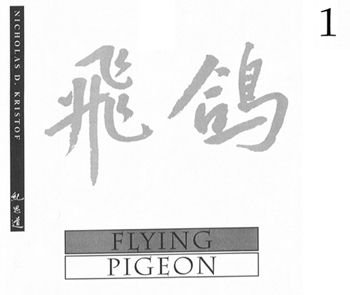
Be sure to prevent any contact between the barbarians and the population.
Emperor Qianlong, October 11, 1793,
ordering the authorities to keep foreign
visitors from talking to Chinese
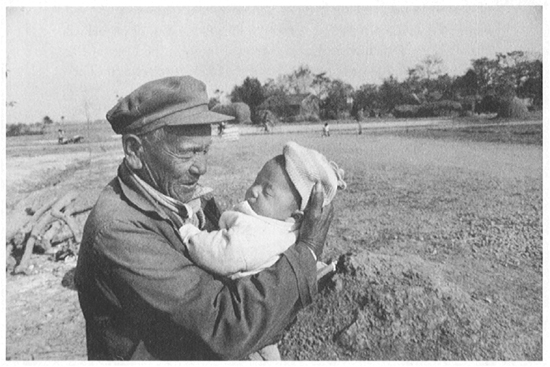
Wang Chigang, an illiterate peasant who early in life was a beggar, wonders what is in store for his great-grandson. [Photo by Nicholas D. Kristof.]
W hat do you say to a crumpled young woman after she has seen her brother beaten to death with iron pipes?
Did he die right there? I asked. On the floor?
Tang Rimei sniffed and nodded. Twenty-three years old, she is tall and thin, with a mouth that naturally perks upward at the sides, as if it were made to smile. But now, as she recounts what happened to her in the southern Chinese city of Shenzhen, she sniffs as if she is about to burst into tears. In her brief career as a dissident, whistle-blower, prisoner, and fugitive, she took on the Chinese state and wonbut at the price of her brothers life. A handful of potbellied British businessmen were relaxing across from us in the Dragon Bar in Hong Kong, their ties loosened and their curiosity aroused. They heard me speaking Chinese to a teary young woman, who would have been attractive if her eyes hadnt been so puffy, and they whispered to one another that a romance must be breaking up.
So what happened when you called the police? I was resolved to press on. I cocked my pen and prepared to scribble her answer in my notebook.
I phoned the police station and shouted at them that some thugs had come to murder me, Tang said softly in a numbed voice. But they said, Oh, we know about this. Its not our affair. The police station was only three minutes away, but no one came. And while I was pleading with them, the telephone operator cut off the phone line. The Boss had connections at the telephone office. By that time, the thugs had smashed open the door.
Tang paused to steady herself, and I pushed the cup of coffee in front of her. She hadnt taken even a sip, and she didnt touch it now.
My big brother tried to protect me, so they hit him with their iron bars. I was screaming, Help! Help! They hit me a little bit, but because my big brother was protecting me they mostly hit him. Then some people came by, and they got scared and ran away.
My big brother was bloody and lying on the floor. He was still breathing, but he had no reactions. I was pleading for people to help. Finally, after fifty minutes, the police came and took my big brother to the hospital. By that time, he had stopped breathing. He was dead.
It was time for me to ask a question, but for a long moment I simply sat there, tensed, my fingers clamped around the pen, as I struggled to contain my feelings. So much in China followed the principle
Font size:
Interval:
Bookmark:
Similar books «China Wakes: The Struggle for the Soul of a Rising Power»
Look at similar books to China Wakes: The Struggle for the Soul of a Rising Power. We have selected literature similar in name and meaning in the hope of providing readers with more options to find new, interesting, not yet read works.
Discussion, reviews of the book China Wakes: The Struggle for the Soul of a Rising Power and just readers' own opinions. Leave your comments, write what you think about the work, its meaning or the main characters. Specify what exactly you liked and what you didn't like, and why you think so.


